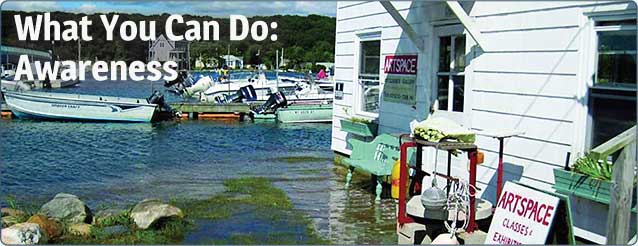
Photo Credit: RI Sea Grant
Keeping Your Head Above Water
The most important thing you can do in dealing with climate change influences is to be aware of what the consequences may be. You must realize what the impacts will be from a serious storm — flooding, toppled trees, and/or serious erosion if you are near the coast or a river. Even small streams can become dangerous torrents. As Superstorm Sandy demonstrated, there is more to the assigning of a storm’s danger quotient than the category of hurricane. Sandy had lost its hurricane status but still wrought massive damage because of its size, its slow rate of travel combined with heavy rains and substantial winds. Over the long term, be aware of the “new normal,” which means that serious storms won’t be isolated incidents like the Floods of 2010. There are many information sites, such as those below, that can help you learn about possible impacts.
- Visit FEMA’s Ready website for resources and advice on preparing for natural disasters such as hurricanes, major storms, earthquakes, and blizzards as well as pandemics and house fires.
- The National Oceanic and Atmospheric Administration (NOAA) provides a wide variety of information on our climate, oceans, and impacts of changing world climate. The Ocean and Coastal Resource Management program gives a good overview of projected changes in climate and the likely impacts of such changes on our oceans. The NOAA website is also a good source of current scientific information about observed changes in our climate and the most recently updated projects of likely future changes.
- Climate Central’s website provides current research and reports on the science and impacts of climate change, including recent news articles and videos about changes and impacts.
“I think that once people understand the great risks that climate change poses, they will naturally want to choose products and services that cause little or no emissions of greenhouse gases, which means ‘low-carbon consumption.’ This will apply across the board, including electricity, heating, transport and food.”
– Nicholas Stern
News
Factoids
The major climate change threats will vary region to region, state to state, and sometimes even county to county. Make sure you know what the major impacts will be to your home so you can prepare accordingly.
In a 2012 poll, 78% of respondents said they believe we are experiencing large storms such as Sandy and Irene more frequently as a result of climate change.
During Superstorm Sandy, mandatory evacuations were ordered for many beach communities including Westerly, Charlestown, Narragansett, South Kingstown and Bristol. Make sure you and your family know the evacuation route and you have a plan for evacuating if a storm is approaching.




